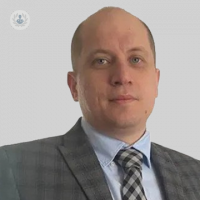What is TURP, and how is it performed to treat an enlarged prostate?
Written in association with:TURP (transurethral resection of the prostate) is a surgical intervention for benign prostatic hyperplasia that aims to improving urinary flow and symptoms.
Here, Mr Edward Calleja, renowned consultant in urology and robotic pelvic surgery based in East Sussex, offers his expert insight into TURP.

What is TURP?
TURP (transurethral resection of the prostate) is a surgical procedure commonly used to treat benign prostatic hyperplasia (BPH), a prostate gland enlargement. TURP aims to relieve symptoms such as frequent urination, difficulty starting urination, or the inability to empty the bladder.
How is TURP performed?
The procedure involves the insertion of a resectoscope - a specialised surgical instrument - through the urethra to access the prostate. The surgeon uses the resectoscope to remove excess tissue obstructing urine flow. This is generally done under spinal or general anaesthesia. During the operation, a solution is used to flush the area and remove resected tissue, aiding in clear visibility for the surgeon.
What are the potential benefits and risks associated with TURP surgery?
Potential benefits
- Improved urinary flow: One of the most immediate benefits is the significant improvement in urine flow, typically experienced by 70% - 80% of patients.
- Lower urinary retention: The risk of urinary retention decreases markedly, relieving patients.
- Improved quality of life: By relieving the symptoms of an enlarged prostate, TURP generally improves overall quality of life for the patient.
Potential risks
- Retrograde ejaculation: Occurs in up to 75% of patients, where semen flows backwards into the bladder rather than out of the penis during ejaculation.
- Infection: Though precautions are taken, there is a risk of urinary tract infection (5% - 10%).
- Bleeding: Heavy bleeding can occur in 2% - 3% of cases, potentially requiring a transfusion.
How long is the recovery period after TURP, and what can patients expect during the healing process?
Recovery period
The typical hospital stay post-TURP is 1 - 2 days. However, some hospitals are doing them as day-case procedures. Patients can expect to return to normal activities within 4 - 6 weeks.
Healing process
- Urinary catheter: A catheter is usually placed to help drain urine for the first few days after surgery.
- Blood in urine: Small amounts of blood or clotting in urine are common but should be reduced over time.
- Frequent urination: Patients may experience frequent urination urges, which generally improve within a few weeks.
Are there alternative treatments for an enlarged prostate, and how does TURP compare to them?
Alternative treatments
- Medications: Drugs like alpha-blockers can relieve symptoms but are generally less effective than TURP in the long term.
- Laser therapy: Provides similar benefits but may be less effective in severely enlarged prostates.
- Prostatic urethral lift: Less invasive but generally less effective in improving urinary flow.
Comparison
TURP is generally considered the gold-standard treatment and has a long-term efficacy rate of up to 85%. Alternative methods may have lower complication rates but often do not offer the same symptom relief.
What common symptoms and indications may lead to a recommendation for TURP surgery?
Common symptoms
- Frequent urination: Especially disruptive nighttime urination.
- Urinary retention: Inability to empty the bladder.
- Urinary tract infections (UTIs): Frequent infections due to poor flow.
Indications for TURP
- Failure of medication: When drug treatments do not provide sufficient relief.
- Severe symptoms: When symptoms severely affect the quality of life.
- Complications: Such as bladder stones or recurrent UTIs.
If you are considering TURP and you would like to consult your options with an expert, don’t hesitate to book an appointment with Mr Edward Calleja via his Top Doctors profile today.


